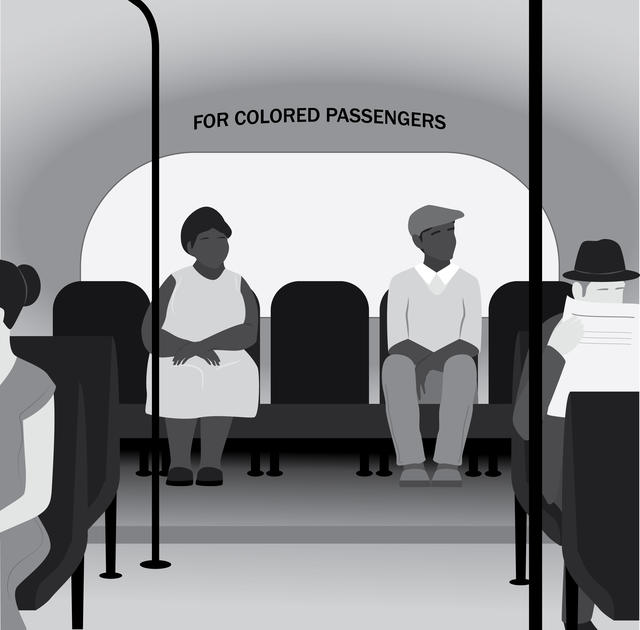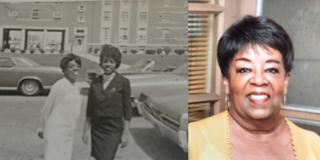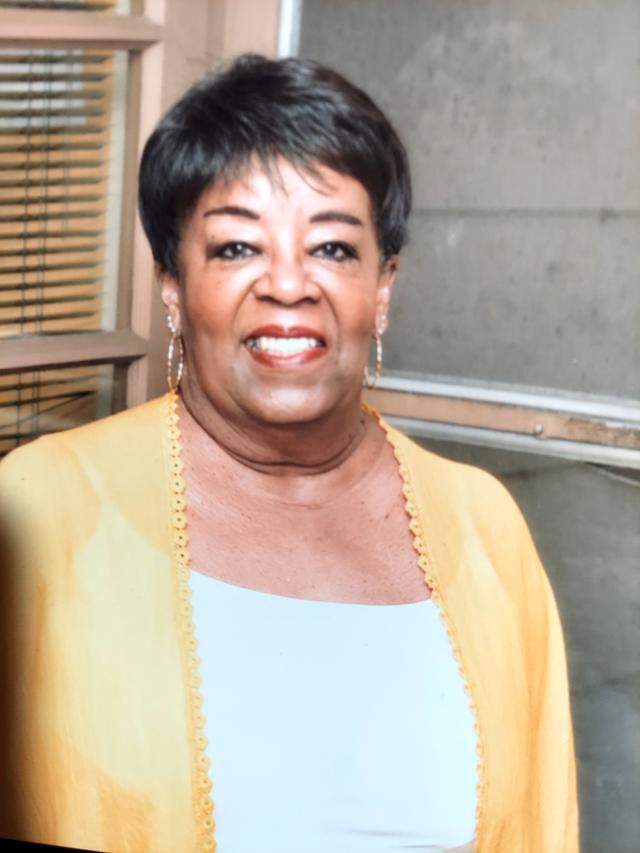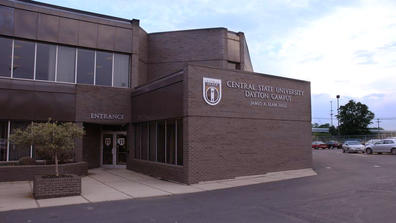
Pioneering alumna enjoys meaningful career while advocating for equity in the workplace

Above: Ethel Washington (left), '69, and her sister, Delores Washington,'68, stand in front of their residence, Williamson Hall, in 1967. The sisters both pledged Delta Sigma Theta Sorority Inc. at Central State University's Delta Kappa Chapter.
Ethel M. Washington is a distinguished historian and author who graduated from Central State University in 1969. Her extensive knowledge and expertise have enabled her to serve various public and private institutions throughout her career.
Washington is a pioneer in her field as she was often the first African American woman, and frequently the first Black person, to hold many of her roles. During the 1970s, while working in higher education, she was the only female administrator at the New Jersey Institute of Technology. Most of the positions she held involving minority work were newly created at the time.
“Somewhere along the way, I had developed great survivor skills,” Washington said. “I marvel at the fact that I was the first Black person in every single position I have ever had throughout my career."
Washington holds a Bachelor of Science in English from Central State University and earned both a Master of Arts and a Master of Education from Columbia University. She pursued doctoral work at Rutgers Graduate School of Social Work and received a Museum Studies Certificate from the Rutgers Graduate School of Art History.
Despite growing up in a segregated society in the South, Washington persevered and pursued her dreams of earning a college degree and building a successful career. She was born and raised in the small African American community of Hallandale, Florida (now Hallandale Beach).
Washington's parents instilled a strong sense of responsibility in their children, encouraging them to work hard and persevere. Her childhood home was a shotgun house, meaning that you could stand in the front and see straight through to the back. Although they struggled to make ends meet, poverty was not a word they used at home. Her father worked as a laborer, while her mother worked as a domestic worker. They raised nine children, five boys and four girls.
Washington admits that she did not know much about her parents' backgrounds, except that her father moved to Miami when he was 19. He liked to say that he returned and got her mother out of the fields, “making it sound like he rescued her,” Washington recalled. Her father was very assertive and liked to remind her mother and everyone else that "he wore the pants.”
In the late 1950s, Central State University was making some big changes. It had just split from Wilberforce University and appointed its first President, Dr. Charles Wesley, who had decided to expand the school's reach by recruiting more students from the South. And to sweeten the deal, CSU was offering full-ride scholarships to the top two graduates of each high school. Washington was one of the lucky students.
But like many other Black students at the time, she faced significant obstacles. Segregation had meant that her educational resources had been limited, and she said others doubted at times about whether she was truly prepared for college.
“They were correct when it came to facilities, but they were totally in the wrong ballpark when it came to our teachers,” Washington said. “Unlike a lot of the students I met up here, even if you did not have a legacy at a particular college and if you were first-generation, you were familiar with a lot of the customs, such as Homecoming.
"Everything was modeled after the Black college.”
Despite the challenges, Washington was determined to succeed. She worked hard in high school and earned the title of salutatorian. With that achievement, she was able to leave her small town and embark on a new adventure in Ohio.
At Central State, Washington found a community of like-minded students from varied backgrounds who were eager to learn and grow. She pursued her passion for language and literature, majoring in English and minoring in speaking and drama. And while she initially doubted her abilities in science, she soon discovered that she was capable of much more than she had ever imagined.
Washington often reminisces about her undergraduate years in Wilberforce, calling them the best four years of her life. After graduating from CSU in 1969, she took on a two-year program in human development, specializing in secondary education, as one of the 42 students at Columbus University.
“I was cognizant of the fact that I was coming from an all-Black Institution. Besides myself, there were six other Black girls and one Puerto Rican guy, and I was the only one who had come from a Black college,” Washington said. “Their experiences were different. I always give credit to Central because I felt like Central had offered a holistic education. There were so many different perspectives and people with different experiences. I felt comfortable there. When I got there, I was just comfortable in my own skin.”
Despite the challenges she faced as a Black woman growing up in a segregated society, Washington has gone on to achieve great success as an author and historian. Still, she has faced much discrimination throughout her life.
“It was hard for me in the public sector,” she said. “Discrimination was an institutional issue. They didn’t embrace the whole the way they should have.”
As an assistant director of Minority Affairs and Special Events, and having held other leadership roles in higher education, Washington took on more responsibilities, which helped her build self-confidence. In her free time, she developed an interest in collecting art and antiques, particularly Black art. One day, she decided to approach the dean at Rutgers University, expressing her desire to enroll in the museum studies program. To her surprise, the dean granted her special permission to do so, even though the program was only available to students enrolled in the Master of Fine Arts program.
“You can’t imagine how I almost fainted. I started taking those classes with no background. But guess what? Ethel survived again,” she said.
Washington has been an advocate for equity, speaking out against injustices both inside and outside the workplace, remaining steadfast in her beliefs.

According to Washington, discrimination in the workplace can be subtle and challenging to identify. Having grown up under segregation, she had not experienced overt racism as a young person, but as an adult, she has encountered institutional racism. Washington pointed out that despite being physically integrated in the North, students of color were often discouraged from taking advanced placement courses or essential math courses.
“It’s the subtleties that I have found that a lot of people don’t understand institutional racism. That’s what you’re confronted with here,” Washington said. “My friends at Central used to call me the woman of the world. One of the things I pointed out to them was that nobody talked about this. You were physically integrated, just sitting in the same classroom, but you were very much being discriminated against. I said, ‘How many of you took AP (advanced placement) courses?’ No matter how smart you were, a guidance counselor would discourage you from taking (those) courses.”
In the end, Washington’s English degree helped her blossom into an award-winning grant writer. While retired, she continues to offer consulting services in Plainfield.
“I’ve been busy trying to keep my mind. My body does whatever it wants to. It doesn’t listen to me anymore. But I’m still blessed at 75,” she said.
Washington's story is a testament to the power of education and the human spirit. Despite facing discrimination and doubt, she was able to rise above it all and become the best version of herself. And in doing so, she paved the way for countless others to follow in her footsteps.
Washington is a 2015 inductee into the Central State University Alumni Achievement Hall of Fame. She is a life member and former board member of the National Alumni Association and served as president of the New Jersey alumni chapter for 10 years.
Hear from Washington directly in an oral history interview published by the Plainfield Public Library and conducted by StoryCorps.
Ethel M. Washington biography
Ethel M. Washington spent her career working in nonprofit cultural organizations and institutions of higher education, including the Educational Departments of the Newark and Montclair Art Museums.
Through her unwavering commitment to preserving culture, heritage, history, and community, Washington has made an indelible impact on Plainfield and the wider region. Her efforts in establishing the African American Design Archive and serving on the Board of Trustees for the Harold B. & Dorothy A. Snyder Foundation since 2012 are a testament to her dedication.

She was the founding program coordinator for the African American Design Archive, Cooper Hewitt, National Design Museum at the Smithsonian Institution in New York City and direct of the Engineering Opportunity Program (EOP) at the New Jersey Institution of Technology in Newark. Washington also served as assistant dean of students for Minority Affairs and Special Events at Douglass College at Rutgers University, the history programs coordinator at the Union County Office of Cultural Heritage Affairs in the Department of Parks and Community Renewal.
She retired as a grants manager for the city of Plainfield after serving in that capacity from 2013-18.
Washington holds many accolades, awards, and honors. In October 2023, she organized and curated “Plainfield Black Tennis History: A Photographic Exhibit,” and researched and wrote the text for the Milton Campbell Plaque installed at Plainfield Milt Campbell Park. She is also the curator of the “Plainfield Mayors” permanent pictorial exhibit installed in the Plainfield City Council meeting room.
She has held three mayoral appointments (Rick Taylor, Harold Mitchell, and Al MacWilliams) to the Plainfield Cultural and Heritage Commission, serving over 10 years.
She was recently honored with a Community Service Award in Plainfield.


